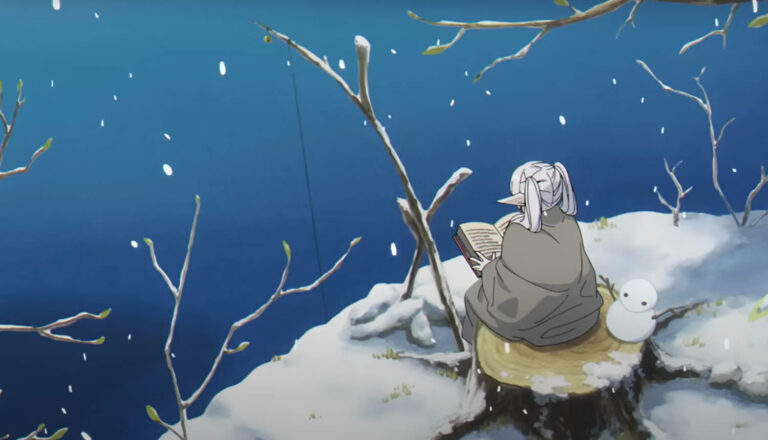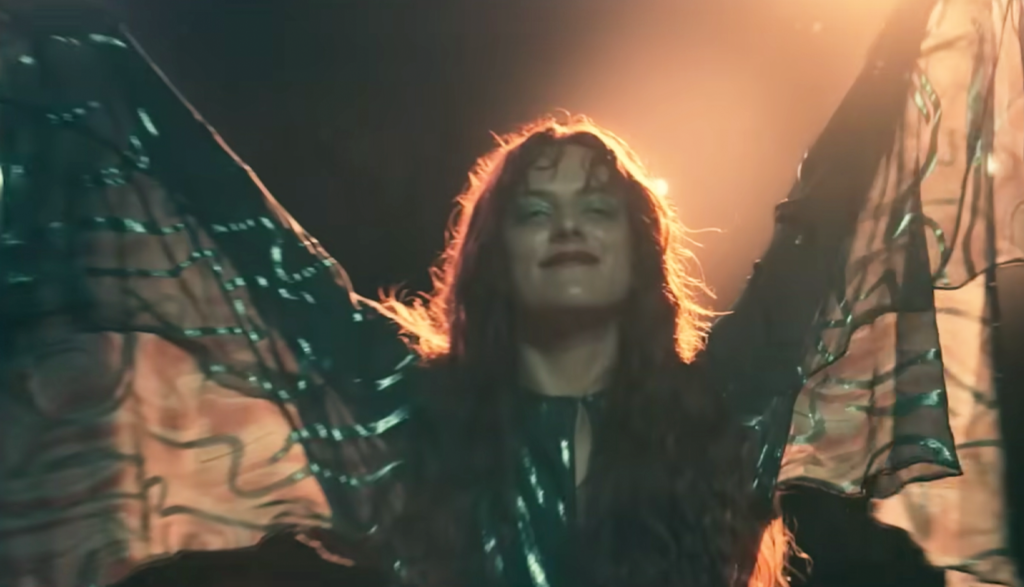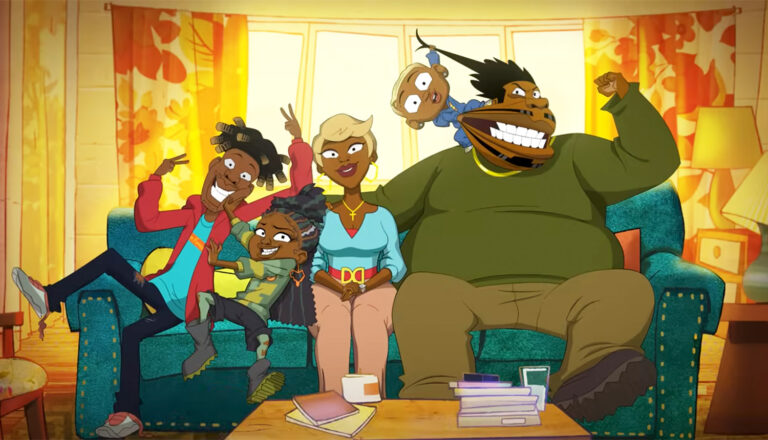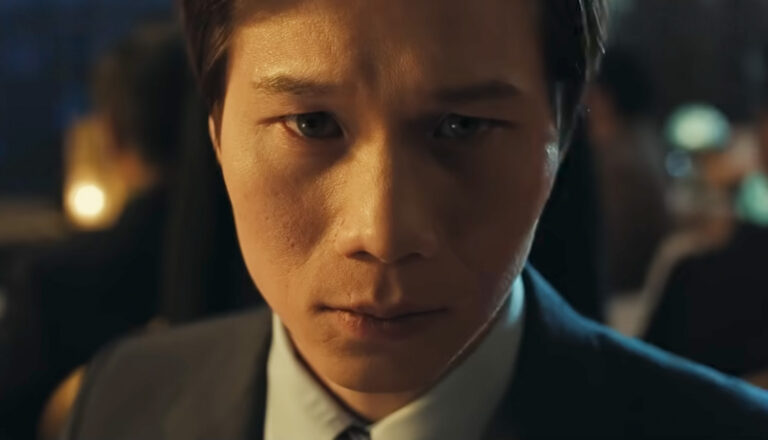
Frieren: Beyond Journey’s End
An elf mage contemplates on connection and regret as she watches her human friends grow old and pass away.

When you hear the old line, “We make beautiful music together,” you know exactly what they mean. That couple is utterly compatible, completely united and, often, in love.
But look at the history of music, and you know that’s not always literally the case. Think of Stevie Nicks and Lindsay Buckingham, whose bitter breakup fueled Fleetwood Mac’s greatest successes. Sonny & Cher split up in 1974, but that didn’t stop them from launching a new television show two years later.
And then there’s Daisy Jones & The Six.
What? You’ve never heard of them? Well, let me introduce you.
Back in the early days of the 1970s, Daisy Jones & the Six were, rather, Daisy Jones. And The Six. The first was an uncompromising singer-songwriter. The other was a rock group of (confusingly) four guys from Pittsburgh and an imported keyboard player. Billy Dunne was the band’s charismatic leader, with brother Graham playing lead guitar. The band called itself the Dunne Brothers, until it became increasingly obvious that the majority weren’t Dunnes, and it was genetically impractical for one (keyboardist Karen) to be a brother.
But when Daisy Jones joined the band, boy howdy. Powered by Billy and Daisy’s electric chemistry and thundering vocals, Daisy Jones & The Six took the 1970s music scene to dinner and kept it out all night.
But while the band was selling out stadiums and earning platinum records, the vibe behind the scenes was more discordant. It was only a matter of time before Daisy Jones & the Six exploded like the Death Star. And sure enough, that blast took place during a live concert at Chicago’s Soldier Field in 1977.
Blame the usual culprits: sex (Billy’s a married family man, but Daisy’s charms are hard for him to resist); drugs (a Costco-sized lot of them) and, of course, rock ‘n’ roll.
Oh, and point a finger at Amazon’s Prime Video, too.
If you’re wondering why you’ve never seen a scandalous-yet-redemptive Behind the Music episode about Daisy & Co., it’s for good reason. The band, technically, never existed. It was the creation of novelist Taylor Jenkins Reid, whose 2019 book (Daisy Jones & the Six, of course) became a massive bestseller.
This 10-episode miniseries apparently downplays some of the book’s problematic content—which, ironically, might be a problem of its own. Reid’s novel told us just how damaging addictions can be, while the show trots out addiction’s horrors less frequently. Infidelity is less a cataclysm and more a momentary shock. Writing for Collider, Maggie Boccella said that the story’s “chain reactions are now less nuclear and more Mentos in a Coke bottle.”
Still, that fizz can still upset your tum-tum something awful.
Characters engage in plenty of steamy intimacy with, often, very little covering (though the show thus far seems to steer clear of outright nudity). LGBT relationships become ancillary plot points. Violence is in the offing, too. And the language can be as blue as a Billie Holiday ballad.
And yes, there will be drugs. People drink, smoke, snort and pop pills nearly to oblivion.
Daisy Jones & the Six—the show, not the band—does indeed feature some beautiful music. Most of its leads have some serious skill, and Prime Video leverages that to full effect. (Riley Keough, who plays Daisy, is the granddaughter of the King himself: Elvis Presley.)
But as a tour through sonic history tells us, beautiful music sometimes comes from some pretty ugly places.
Twenty years after Daisy Jones & the Six publicly imploded during a 1977 concert, the band members talk about their history for the first time on camera. From that setup, we flash back to the band members’ backstories: Daisy’s pampered-but-chilly upbringing in Los Angeles and the Dunne Brothers’ early gigs in Pittsburgh.
We see Daisy as a 15-year-old, sneaking out to sample Los Angeles’ thriving music scene. It’s suggested she was assaulted by a musician at that tender age (“I was a baby,” a modern-age Daisy tells the camera, though the only thing we see on screen is Daisy asking where everyone is as the musician ominously shuts his hotel room door.) The experience doesn’t dissuade her from the scene, though: We see her in a variety of unsavory settings wearing a variety of barely-there tops, ingesting a variety of substances (liquor, marijuana and pills that no one quite knows what they are). She takes a shower in a beau’s hotel room (though we don’t see anything critical). At a party, she meets singer Simone Jackson—destined to be a “disco pioneer”—who breaks up with her girlfriend at a party.
In Pittsburgh, Billy and Graham Dunne run into their father at a gig—a father who abandoned them when Graham was just 4 years old. The older Dunne is lecherously hanging all over a woman half his age when the brothers spot him. They later confront him, and one punches Dad in the face.
Billy meets future wife, Camila. The two kiss; and when Billy and the band decide to go to Los Angeles to make their fortune, Camila goes along (much to her mother’s chagrin).
We see beer quaffed, liquor consumed, cocaine snorted and other drugs ingested. Characters smoke plenty of cigarettes. Characters say the f-word 15 times, the s-word three times. Other profanities include “a–,” “b–ch” and “h—.” God’s name is misused once.
The Dunne Brothers band decides to change its name to The Six (in spite of the fact that there’s just five folks in the band itself), and they start their climb to the top—in a bar called Filthy McNasty’s. Meanwhile, Daisy waits tables and, with friend Simone’s help, begins to explore her musical talent. And producer Teddy Price—a musical bigwig on a cold streak—takes interest in both Daisy and the band.
Teddy signs The Six to a contract and sends them out on tour shortly after Billy’s wife, Camila, announces she’s pregnant. Billy and Camila get married before the tour begins, but it’s not long before Billy succumbs to pretty much every temptation the road offers. He often performs in a state of ridiculous impairment, and when Camila shows up unexpectedly, she catches him in a sexual act with two women.
Daisy’s sexually active on camera, too: She’s having sex with a guy (we see her from the back, and we see a bit of hear rear) when she decides she’d rather write another song instead. A couple engages in foreplay on their own bed—she in a flimsy nightgown, he in his underwear. We see evidence of Billy’s growing alcohol dependence and watch as he snorts cocaine. He later vomits along the side of the road. In the “present,” Camila shows a picture from she and Billy’s wedding where the tops of their heads have been cut off. The photographer sheepishly tells the documentarian, “Mescaline is a powerful drug.”
We see a trio of bandmates mock fight in their shared house—one wearing just his brief-style underwear, the other wearing a women’s dress. No bandmate will sleep in a “haunted” bedroom until Karen is hired. Characters smoke cigarettes and drink wine. The f-word is used 21 times and the s-word four times. We also hear “a–,” “b–ch,” “d–n” and “h—.” God’s name is misused twice, once with the word “d–n.” Jesus’ name is also abused twice.


Paul Asay has been part of the Plugged In staff since 2007, watching and reviewing roughly 15 quintillion movies and television shows. He’s written for a number of other publications, too, including Time, The Washington Post and Christianity Today. The author of several books, Paul loves to find spirituality in unexpected places, including popular entertainment, and he loves all things superhero. His vices include James Bond films, Mountain Dew and terrible B-grade movies. He’s married, has two children and a neurotic dog, runs marathons on occasion and hopes to someday own his own tuxedo. Feel free to follow him on Twitter @AsayPaul.

An elf mage contemplates on connection and regret as she watches her human friends grow old and pass away.

Netflix takes a classic sitcom, Good Times, and turns it into a vulgar, violent, sexually-charged TV-MA show.

While its protagonist might live a nuanced life, The Sympathizer’s problematic content can’t be described the same way.